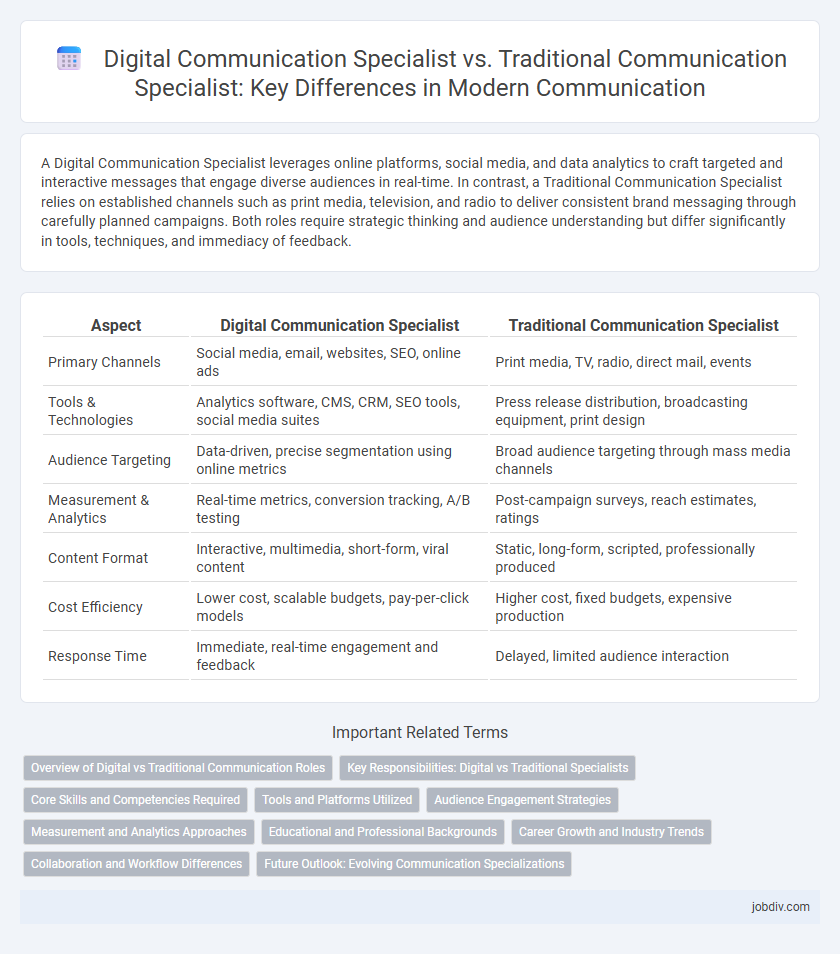A Digital Communication Specialist leverages online platforms, social media, and data analytics to craft targeted and interactive messages that engage diverse audiences in real-time. In contrast, a Traditional Communication Specialist relies on established channels such as print media, television, and radio to deliver consistent brand messaging through carefully planned campaigns. Both roles require strategic thinking and audience understanding but differ significantly in tools, techniques, and immediacy of feedback.
Table of Comparison
| Aspect | Digital Communication Specialist | Traditional Communication Specialist |
|---|---|---|
| Primary Channels | Social media, email, websites, SEO, online ads | Print media, TV, radio, direct mail, events |
| Tools & Technologies | Analytics software, CMS, CRM, SEO tools, social media suites | Press release distribution, broadcasting equipment, print design |
| Audience Targeting | Data-driven, precise segmentation using online metrics | Broad audience targeting through mass media channels |
| Measurement & Analytics | Real-time metrics, conversion tracking, A/B testing | Post-campaign surveys, reach estimates, ratings |
| Content Format | Interactive, multimedia, short-form, viral content | Static, long-form, scripted, professionally produced |
| Cost Efficiency | Lower cost, scalable budgets, pay-per-click models | Higher cost, fixed budgets, expensive production |
| Response Time | Immediate, real-time engagement and feedback | Delayed, limited audience interaction |
Overview of Digital vs Traditional Communication Roles
Digital Communication Specialists leverage social media, SEO, email marketing, and analytics tools to design targeted campaigns that engage online audiences and measure impact in real time. Traditional Communication Specialists focus on print media, press releases, public relations events, and broadcast channels to maintain brand presence and manage public perceptions through established offline methods. The evolving communication landscape demands hybrid skills, but digital roles prioritize data-driven strategies and real-time interaction, whereas traditional roles emphasize relationship-building and long-term reputation management.
Key Responsibilities: Digital vs Traditional Specialists
Digital Communication Specialists manage online content creation, social media strategies, and data analytics to enhance brand presence, leveraging SEO and digital marketing tools. Traditional Communication Specialists focus on press releases, event coordination, and media relations, emphasizing print and broadcast channels to maintain public engagement. Both roles require strong communication skills, but the digital specialist prioritizes real-time interaction and performance metrics, while the traditional specialist centers on established media outlets and face-to-face networking.
Core Skills and Competencies Required
Digital Communication Specialists require proficiency in data analytics, social media management, and content creation optimized for online platforms, emphasizing SEO and digital marketing strategies. Traditional Communication Specialists excel in media relations, public speaking, and print media expertise, focusing on interpersonal communication and brand messaging through conventional channels. Both roles demand strong writing abilities, strategic thinking, and the capacity to tailor messages for diverse audiences but differ significantly in technological fluency and platform-specific skills.
Tools and Platforms Utilized
Digital Communication Specialists leverage advanced tools such as social media management platforms, email marketing software, SEO analytics, and content management systems to create targeted and measurable campaigns. Traditional Communication Specialists rely more on print media, broadcast outlets, and direct mail combined with public relations events to reach audiences. The digital approach emphasizes data-driven strategies and real-time engagement, while the traditional method focuses on established, broad-reaching channels without immediate feedback mechanisms.
Audience Engagement Strategies
Digital Communication Specialists leverage data analytics and social media platforms to craft personalized content, enhancing real-time audience interaction and engagement. Traditional Communication Specialists rely on established channels such as print media, television, and public events to build trust and convey consistent brand messaging to targeted demographics. Emphasizing multi-channel strategies, digital experts prioritize interactive campaigns, while traditional experts excel in structured storytelling and direct community outreach.
Measurement and Analytics Approaches
Digital Communication Specialists leverage real-time analytics tools, such as Google Analytics, social media insights, and A/B testing, enabling precise measurement of engagement, reach, and conversion rates. Traditional Communication Specialists often rely on surveys, focus groups, and media monitoring to assess campaign impact, which provides valuable but less immediate data. The integration of advanced digital metrics allows for dynamic strategy adjustments and ROI optimization compared to the retrospective analysis typical in traditional methods.
Educational and Professional Backgrounds
Digital Communication Specialists often possess degrees in digital media, communication technology, or marketing, with strong skills in social media management, SEO, and data analytics. Traditional Communication Specialists typically hold backgrounds in journalism, public relations, or corporate communication, emphasizing interpersonal skills, media relations, and content creation for print and broadcast. Professional experience for digital roles centers on online campaign management and digital tools proficiency, while traditional roles prioritize press releases, event coordination, and managing stakeholder relationships.
Career Growth and Industry Trends
Digital Communication Specialists experience rapid career growth driven by the increasing demand for expertise in social media, data analytics, and content marketing across diverse industries. Traditional Communication Specialists maintain steady opportunities in corporate communications, public relations, and media relations, but face slower progression due to digital transformation prioritizing online engagement. Industry trends emphasize digital skills, with employers valuing proficiency in SEO, digital campaigns, and real-time analytics for competitive advantage.
Collaboration and Workflow Differences
Digital Communication Specialists leverage collaborative tools like Slack, Trello, and cloud-based platforms to streamline workflow, enabling real-time updates and seamless remote teamwork. Traditional Communication Specialists often rely on in-person meetings, phone calls, and email chains, which can slow down information exchange and create workflow bottlenecks. The integration of digital tools fosters a more agile, transparent, and efficient collaboration environment compared to conventional communication methods.
Future Outlook: Evolving Communication Specializations
Digital Communication Specialists lead the future with expertise in social media strategy, data analytics, and emerging technologies like AI-driven content creation, outperforming Traditional Communication Specialists who primarily rely on established channels such as print and broadcast media. The demand for digital-savvy professionals is growing due to increasing online consumer engagement and real-time interaction capabilities. Evolving communication specializations emphasize adaptability, multimedia proficiency, and data-driven decision-making as core competencies for successful communication careers.
Digital Communication Specialist vs Traditional Communication Specialist Infographic

 jobdiv.com
jobdiv.com